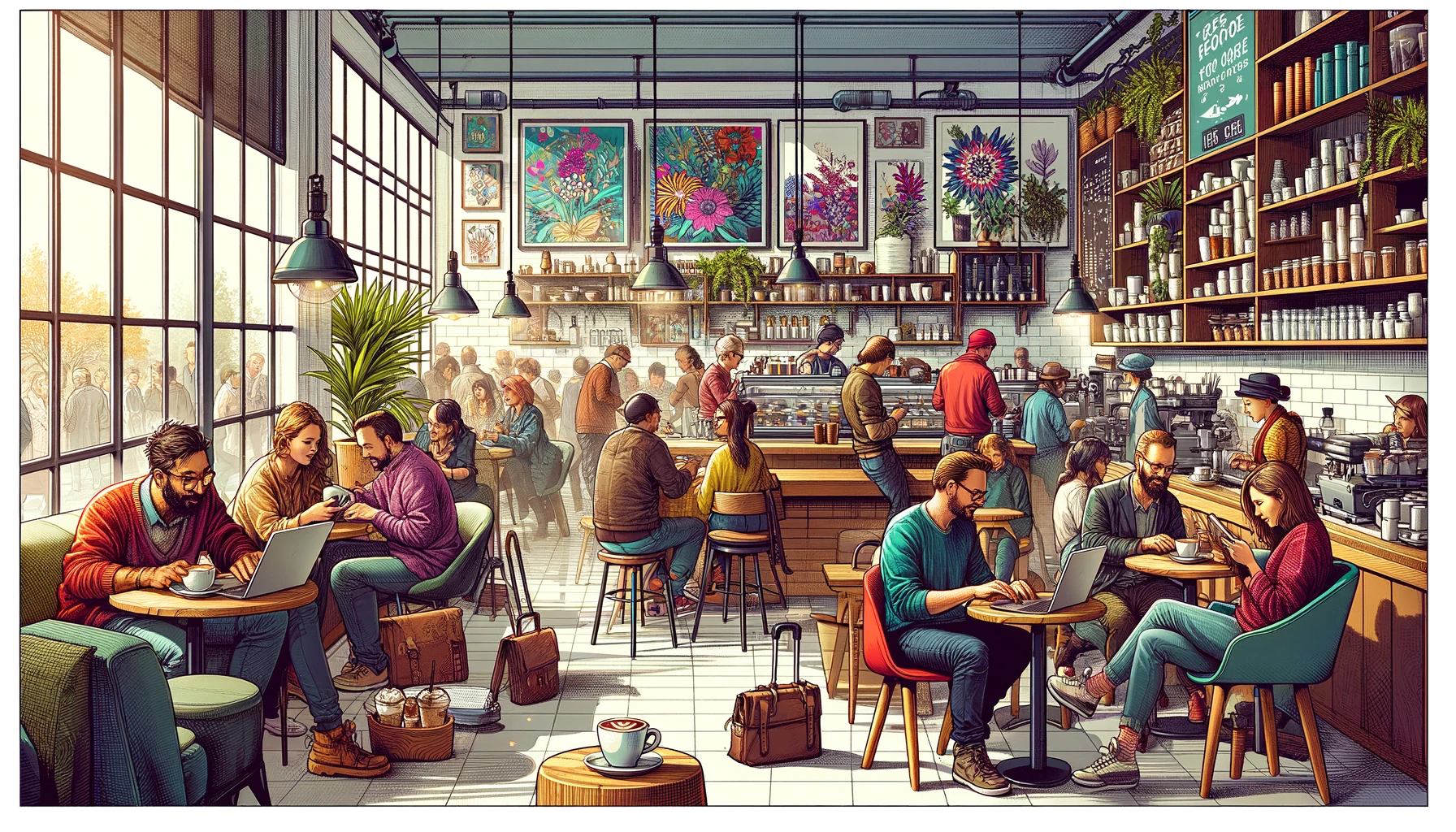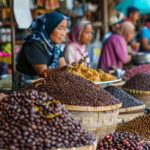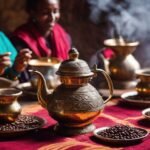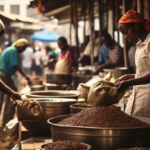The allure of coffee transcends mere taste, weaving into the fabric of societies around the globe. This beloved beverage, steeped in history and tradition, has fostered a rich and diverse coffee culture that varies dramatically from one region to another.
From the birthplace of coffee in the Ethiopian highlands to the specialty coffee shops of Australia and beyond, each locale offers a unique perspective on coffee cultivation, preparation, and consumption. Our exploration of the global tapestry of coffee culture invites you on a journey to discover the distinctive coffee traditions and innovations that define and enrich the coffee scenes across continents.
As we delve into the heart of coffee culture around the world, we uncover the historical roots, agricultural practices, and social rituals that shape the coffee experience in each region. From Africa’s coffee ceremonies to Italy’s espresso bars, and from the Scandinavian pursuit of coffee perfection to the emerging specialty scenes in Asia and the Pacific, this exploration highlights the global love affair with coffee.
Our journey does not stop at the well-known coffee powerhouses but also ventures into regions where coffee culture is blossoming, revealing a growing appreciation for quality, sustainability, and community in the coffee industry.
This article serves as your gateway to a deeper understanding of how coffee connects us across different cultures, landscapes, and traditions. By exploring the detailed pages linked from here, you will embark on a cultural and sensory expedition, uncovering the stories, flavors, and people behind the world’s most cherished beverage. Join us as we traverse the globe, cup by cup, celebrating the diversity and unity of the coffee world.
Coffee culture is growing globally, with many countries experiencing a surge in interest in both the consumption and production of coffee. There is a cultural Wave of Coffee and it has global implications. Below is a list of countries within the specified regions where coffee culture is notably growing or already well-established:
Africa
-
- Ethiopia: Often heralded as the birthplace of coffee, Ethiopia cherishes its coffee culture through traditional ceremonies and the diversity of its beans, celebrated for their floral, fruity, and wine-like qualities. Ethiopian coffee ceremonies, involving the roasting, grinding, and brewing of coffee in a jebena (clay pot), are a cornerstone of social life.
- Kenya: Kenya is renowned for its cooperative system of coffee production, which produces beans known for their bright acidity, full body, and rich flavor, often with berry undertones. Kenyan coffee culture is as vibrant as its coffee, with a growing appreciation for local beans in urban coffee shops.
- Rwanda: Known as the land of a thousand hills, Rwanda’s coffee culture has grown significantly, with coffee playing a key role in the country’s recovery and economic development. Rwandan coffees are appreciated for their sweet and fruity flavors, often with a distinct brightness.
- Uganda: While less known than its neighbors for specialty coffee, Uganda is one of Africa’s largest coffee producers, primarily of robusta beans. The country is increasingly focusing on quality and the specialty market, with its arabica coffees gaining recognition for their unique attributes.
- Ivory Coast (Côte d’Ivoire): Primarily known for its robust coffee production, Ivory Coast is also home to a growing number of arabica producers. Coffee culture here is evolving, with an increasing domestic interest in coffee quality and consumption. It has a growing coffee culture.
- Tanzania: Tanzanian coffee, like its Kilimanjaro, offers a range of flavors from bright and acidic to sweet and full-bodied. Coffee culture in Tanzania is expanding, with a focus on enhancing the quality and international profile of its coffee.
- Yemen: Though geographically part of the Arabian Peninsula, Yemen’s historical and cultural ties to coffee place it within the narrative of African coffee. Yemeni coffee is distinct for its rich, complex flavor profile, deeply intertwined with the country’s ancient coffee cultivation and trading history.
Africa’s contribution to the world of coffee is immeasurable, not only providing some of the world’s most sought-after beans but also enriching the global coffee culture with its traditions, ceremonies, and evolving coffee scenes. The continent’s diverse climates and landscapes allow for a wide variety of coffee types, each with its own story, flavor profile, and cultural significance.
Asia/Pacific
-
- Vietnam: As the world’s second-largest coffee producer, primarily of robusta beans, Vietnam is known for its strong, intense coffee culture. The country is famous for its unique preparations, such as Vietnamese iced coffee (cà phê sữa đá) and egg coffee (cà phê trứng).
- Indonesia: Indonesia’s vast archipelago offers a variety of coffee experiences, from the earthy and rich Sumatran coffee to the sweet and floral Java Arabica. The country’s traditional processing methods and diverse microclimates contribute to the unique profiles of its coffees.
- Australia: Though not a coffee producer, Australia has a sophisticated coffee scene known for high-quality espresso and innovation. The country has popularized coffee trends worldwide, including the flat white, and boasts a competitive and vibrant café culture.
- China: China is rapidly becoming a significant player in both coffee production and consumption. The Yunnan province is noted for its high-quality Arabica production, while the country’s urban centers see a growing demand for coffee and café culture, blending traditional tea practices with modern coffee trends.
- Japan: Japan’s coffee culture is one of precision and ritual, offering everything from meticulously brewed pour-overs in minimalist cafés to the fast-paced world of canned coffee. The country’s historic kissaten (coffee shops) coexist with modern specialty coffee roasters, highlighting a deep respect for the craft of coffee.
The Asia/Pacific region exemplifies the dynamic nature of global coffee culture, showcasing a range of coffee experiences from traditional to modern, and playing an increasingly significant role in both the production and consumption of coffee.
Caribean
- Jamaica: Jamaica is famous for its Blue Mountain coffee, one of the world’s most prestigious and sought-after coffees. Grown in the high elevations of the Blue Mountains, this coffee is admired for its mild flavor, smoothness, and bright acidity, along with a lack of bitterness.
- Puerto Rico: Despite challenges, Puerto Rico continues to produce high-quality coffee, known for its rich history dating back to the 18th century. Puerto Rican coffee is characterized by its balanced body, acidity, and aromatic qualities, with hints of chocolate and fruit.
- Dominican Republic: The Dominican Republic’s coffee is grown primarily in the mountainous regions of the island, offering a variety of flavor profiles from rich and bold to smooth and sweet. The country’s coffee culture is marked by its emphasis on organic and sustainable farming practices.
- Haiti: Once a major coffee producer, Haiti’s coffee industry is smaller now but still produces coffee beans known for their mellow acidity and rich, full-bodied flavor. Haitian coffee cultivation is largely organic, relying on traditional farming methods.
- Cuba: Cuban coffee is as rich in flavor as it is in history, known for its strong, robust taste. Coffee in Cuba is often prepared using the espresso method, resulting in a potent and sweetly aromatic cup, frequently enjoyed as part of a social ritual.
- The Caribbean’s coffee culture is deeply intertwined with its history, climate, and the vibrant spirit of its people. Despite the region’s relatively small size compared to other coffee-producing areas, the Caribbean islands are proud producers of some of the most exquisite and highly valued coffees in the world, each with its unique attributes and flavors.
Central America
-
- Guatemala: Guatemala’s diverse microclimates produce a wide range of coffee profiles, from the bright and fruity notes of Antigua to the chocolatey depth of Huehuetenango. The country’s rich coffee culture is supported by smallholder farms and cooperatives focused on quality.
- Costa Rica: Known for its pioneering role in sustainable coffee production, Costa Rica emphasizes environmental stewardship and traceability in its coffee sector. Its coffees are often characterized by a clean, balanced profile with crisp acidity.
- Panama: While smaller in volume, Panama’s coffee industry has gained international acclaim, especially for its Geisha variety, celebrated for its floral aromatics and complex flavor profile. Panama’s coffee culture is marked by innovation and a pursuit of excellence.
- El Salvador: With a focus on specialty coffees, El Salvador’s coffee industry is known for its sweet, balanced cups, with farms often experimenting with processing methods to enhance flavor profiles.
- Honduras: Emerging as one of the top coffee producers in Central America, Honduras offers a wide variety of coffee profiles, from soft and nutty to more vibrant and fruity cups, thanks to its diverse growing regions.
- Nicaragua: Nicaragua’s coffee sector has seen growth in specialty coffee, with producers focusing on sustainable practices and quality improvements. Nicaraguan coffees are known for their mild, balanced profile, often with chocolatey and fruity notes.
Central America’s coffee culture is integral to its identity, with each country offering unique contributions to the world’s coffee scene. The region’s focus on quality, sustainability, and innovation continues to elevate its status in the global coffee industry, delighting coffee enthusiasts worldwide with its exceptional beans.
South America
-
- Brazil: As the world’s largest coffee producer, Brazil is synonymous with coffee. Its vast coffee plantations cover several climatic zones, producing a wide range of coffee types, from sweet and chocolatey to more nuanced and fruity profiles. Brazil’s coffee culture is as vast as its production, influencing global coffee trends and consumption.
- Colombia: Known for its smooth, well-balanced coffee, Colombia has a strong national identity tied to coffee production. The country’s diverse landscapes and microclimates allow for the cultivation of high-quality Arabica beans, celebrated for their mild flavors and aromatic richness.
- Peru: Emerging as a leader in organic coffee production, Peru’s coffee culture is deeply connected to its indigenous roots and sustainable agriculture practices. Peruvian coffees are often noted for their bright acidity and diverse flavor profiles, ranging from floral to fruity.
- Ecuador: Ecuador’s unique position along the Andes allows for the cultivation of high-altitude coffees with distinct profiles, often characterized by a bright acidity and rich, complex flavors. The country’s coffee culture is evolving, with a growing focus on specialty coffee and direct trade.
- Venezuela: Although smaller in production, Venezuelan coffee has a rich history, with its coffee culture dating back centuries. The country’s coffees are known for their sweet, mild profiles with a chocolaty richness, reflective of its tropical climate and fertile soils.
- Bolivia: Bolivia’s coffee industry is marked by its focus on organic and specialty coffees, produced in small quantities but with high quality. Bolivian coffees often feature unique flavors, from floral to nutty and fruity, thanks to the country’s varied ecosystems.
South America’s contribution to the coffee world is immense, offering a wide palette of tastes and aromas that reflect the continent’s diverse climates and coffee-growing traditions. The region’s commitment to quality and sustainable practices continues to shape the global coffee industry, making South American coffees a staple for enthusiasts and professionals alike.
Central America
-
- Guatemala: Offers a spectrum of coffee profiles thanks to its varied microclimates. Coffees from Antigua are celebrated for their chocolatey notes and bright acidity, while those from Huehuetenango are known for their sweet fruit flavors and floral aromas.
- Costa Rica: Prides itself on its sustainable coffee farming practices and the traceability of its coffee beans. Costa Rican coffee is renowned for its high quality, often featuring crisp, clean flavors with bright acidity and a medium body.
- Panama: While known for its famous Geisha coffee, which fetches some of the highest prices worldwide due to its exceptional quality and unique floral and fruity notes, Panama’s overall coffee culture is defined by a focus on specialty beans and innovative processing methods.
- El Salvador: Has a growing reputation for specialty coffees, with a focus on bourbon and pacamara varietals. Salvadoran coffees are often characterized by their balanced, sweet profiles, with chocolate and fruit notes.
- Honduras: Is rapidly emerging as a leading coffee producer, offering a wide range of flavor profiles from chocolatey and sweet to bright and fruity. Honduras has made significant strides in quality and sustainability in recent years.
- Nicaragua: Known for its well-balanced coffees with sweet, fruity notes, and a smooth, creamy body. The country’s coffee sector has focused on enhancing its specialty coffee offerings and sustainable practices.
- Belize: While smaller in production, Belize’s coffee culture is on the rise, with an emphasis on organic farming and the production of shade-grown coffee, contributing to the preservation of its natural ecosystems.
Central America’s contribution to the global coffee scene is profound, with each country offering unique flavors and stories. The region’s coffee culture is marked by a blend of tradition and innovation, where the passion for coffee goes hand in hand with a commitment to environmental stewardship and social responsibility.
Europe
-
- Italy: The heart of espresso culture, Italy has given the world the espresso, cappuccino, and latte. Italian coffee culture is an integral part of daily life, with a focus on quality and the social aspect of coffee drinking.
- France: Known for its iconic café culture, France offers a leisurely approach to coffee, often enjoyed in picturesque cafés along Parisian boulevards. French press coffee, though not originating from France, is widely used across the globe.
- United Kingdom: The UK has seen a significant rise in specialty coffee shops and a growing appreciation for quality coffee brewing methods. London, in particular, is a hub for coffee innovation and third-wave coffee culture.
- Netherlands: Dutch coffee culture is known for its gezelligheid, a concept that encompasses the cozy, convivial spirit of enjoying coffee with others. The Netherlands also played a historical role in the spread of coffee cultivation globally.
- Scandinavia (Norway, Sweden, Denmark, Finland): Scandinavians are among the highest coffee consumers per capita in the world. The region is known for its light roast preferences and the emphasis on ethical sourcing and sustainability in coffee.
- Spain: Spanish coffee culture is diverse, with unique offerings like café con leche and cortado. Coffee in Spain is typically enjoyed in a social setting, often in bars and cafés throughout the day.
- Germany: Germany’s coffee culture includes traditional kaffee und kuchen (coffee and cake) and a growing interest in specialty coffee. Berlin, in particular, has become a hotspot for coffee enthusiasts and third-wave coffee shops.
- Portugal: Portugal is renowned for its strong, robust coffees, with a particular fondness for espresso. Coffee is an essential part of daily life, often enjoyed in local pastelarias with pastries.
Europe’s contribution to coffee culture extends beyond its borders, influencing coffee preparation, consumption, and appreciation worldwide. The continent’s diverse coffee cultures reflect a blend of tradition, innovation, and a deep appreciation for the coffee experience.
Central America
- Guatemala: Celebrated for its diverse microclimates, Guatemala offers a rich array of coffee profiles, from the bright acidity of Antigua to the chocolatey notes of Huehuetenango, supported by a strong tradition of coffee cultivation.
- Costa Rica: Known for its meticulous approach to quality and traceability, Costa Rica’s coffee culture is defined by sustainable farming practices and a focus on preserving the environment, yielding beans that are as ethical as they are flavorful.
- Panama: While smaller in production volume, Panama has made a significant impact on the specialty coffee world, particularly with its Geisha variety. Panamanian coffee culture is marked by innovation and a commitment to quality that rivals more established coffee-producing regions.
Central America’s contribution to coffee culture extends beyond production; it’s a region where coffee is a way of life, deeply woven into the social fabric and economies of these countries. The region’s focus on sustainable practices and quality has solidified its status as a key player in the global coffee industry.
North America
- United States (excluding Hawaii): The United States has a dynamic and evolving coffee scene, ranging from the widespread consumption of drip coffee to a robust specialty coffee movement that emphasizes artisanal brewing methods and direct trade sourcing. Cities like Seattle, Portland, and San Francisco are considered pioneers of the third wave coffee movement, focusing on high-quality, sustainably sourced beans and innovative brewing techniques.
- Canada: Canada’s coffee culture is characterized by its widespread café culture and the popularity of coffee chains, alongside a growing interest in specialty coffee. Canadian cities like Vancouver, Toronto, and Montreal have vibrant coffee scenes, with numerous independent coffee shops and roasters focusing on quality, sustainability, and community engagement.
- Mexico: As a significant coffee-producing country, Mexico not only contributes high-quality beans to the global market but also has a rich domestic coffee culture. Mexican coffee culture includes traditional methods of preparation like café de olla, and there’s a growing specialty coffee scene in urban areas, focusing on the country’s diverse coffee-producing regions.
- Hawaii: Renowned for its unique coffee culture, Hawaii’s coffee legacy is anchored in the globally acclaimed Kona coffee. The local coffee culture is characterized by a deep appreciation for the craft of coffee growing and brewing, with a focus on quality and tradition.
North America’s coffee culture is diverse, with its rich tapestry of coffee practices ranging from the consumption of large volumes of coffee in casual settings to the meticulous preparation and enjoyment of specialty coffees in cafes and homes. The region’s influence on global coffee trends, including the promotion of ethical sourcing, environmental sustainability, and coffee education, continues to grow, making it a significant player in the worldwide coffee community.
South America
-
- Brazil: The world’s largest coffee producer, Brazil’s vast landscapes offer everything from smooth and chocolatey to bright and fruity coffees. Brazilian coffee culture is as rich as its production, with coffee being a staple in daily life.
- Colombia: Known for its smooth, well-balanced Arabica coffee, Colombia’s coffee culture is deeply ingrained in its national identity. The country’s diverse climates across its mountainous regions allow for the cultivation of high-quality beans year-round.
- Peru: A rising star in the specialty coffee world, Peru is recognized for its organic and fair trade coffees. Peruvian coffee culture is marked by a focus on sustainable practices and the production of beans with unique flavor profiles, from citrusy and floral to chocolatey and nutty.
- Ecuador: Although smaller in volume, Ecuador’s coffee is gaining recognition for its quality and unique profiles, thanks to its varied microclimates. Ecuadorian coffee culture is evolving, with an increasing focus on specialty coffee and direct trade.
- Venezuela: Traditionally known for its fine cacao, Venezuela also produces coffee, primarily for domestic consumption. Venezuelan coffees are often mild, with a sweet and fruity character.
- Bolivia: Bolivia’s coffee culture is characterized by its commitment to organic farming and the production of high-altitude specialty coffees. Bolivian coffees are known for their bright acidity and complex flavors.
South America’s contribution to the global coffee narrative is significant, with each country offering distinct beans and unique coffee experiences. The continent’s passion for coffee extends from the fields where it is cultivated with care, through to the global markets where South American coffees are celebrated for their exceptional quality and diversity.
Middle East
-
- Turkey: Turkey is renowned for its traditional Turkish coffee, a UNESCO Intangible Cultural Heritage, celebrated for its unique preparation method where finely ground coffee is simmered in water with sugar and often served with a layer of foam. Turkish coffee culture is deeply interwoven with hospitality and social tradition.
- Saudi Arabia: In Saudi Arabia, coffee, specifically Arabic coffee (qahwa), is a symbol of hospitality, served to guests in homes and at social gatherings. It’s typically light in roast, spiced with cardamom, and served in small cups alongside dates.
- Iran: Although tea plays a predominant role in Iranian culture, coffee has its place, especially in modern urban settings where coffee shops and cafes are becoming increasingly popular. Traditional Persian coffee houses (qahveh khaneh) have a long history of serving as communal hubs.
- Lebanon: Lebanese coffee culture is robust, with a strong preference for Arabic-style coffee similar to that in other parts of the Middle East. Coffee plays a significant role in social and family gatherings, prepared with a light roast and cardamom.
The Middle East’s contribution to global coffee culture is foundational, with its centuries-old traditions, methods of preparation, and the social significance of coffee continuing to influence how coffee is enjoyed worldwide. The region’s coffee culture is characterized by a deep respect for tradition, a focus on community, and the art of coffee preparation and consumption as an integral part of daily life and hospitality.
The Middle East’s contribution to the world of coffee is profound, with the region being home to some of the earliest coffee houses and coffee culture practices. The traditional methods of coffee preparation and consumption in the Middle East have left a lasting impact on how coffee is appreciated worldwide, emphasizing the beverage’s role in fostering social ties and community.
There is a cultural wave of coffee and it has a global implication.






